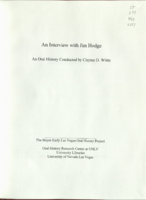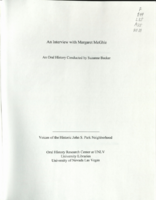Search the Special Collections and Archives Portal
Search Results

Transcript of interview with Dr. Jacob Paz by Claytee White, September 15, 2014
Date
Archival Collection
Description
During the 1950s, Dr. Jacob Paz grew up in an agricultural environment in Israel where he attended a very famous high school in Israel called Kadoorie where Yitzhak Rabin was a student. After his graduation, Jacob joined the Israeli army building his skills so that he could get into technical school after he fulfilled his army service. For two years he attended technical school and then started working for the Israel Atomic Energy Commission in Dimona, Israel making atomic bombs in the 1960’s. After working in Dimona, Jacob was accepted into UC Davis and moved to the United States to study veterinary medicine. After one semester, he realized that he preferred history and left California for New York City, There he earned degrees in Jewish history and chemistry from the Jewish Theological Seminary. He quickly moved onto graduate school and earned his master’s degree in marine science and environment from CW Post, Long Island University in Greenvale, New York. In 1972, he returned to I
Text

Transcript of interview with Joanna S. Kishner by Barbara Tabach, January 10, 2017
Date
Archival Collection
Description
Joanna Kishner epitomizes the native Southern Nevada who was raised in both a Jewish and secular world of Las Vegas. A daughter of Ellen Neafsey Jobes and Irwin Kishner, she was born in 1964 and graduated from Clark High School in 1982. As she recalls, the halls of Clark High School witnessed a stellar cast of characters in the early 1980s, from future casino executives, to additional judges, to comedian Jimmy Kimmel. Judge Kishner earned a double major in Political Science and Psychology from Claremont McKenna College (1986) and graduated from UCLA School of Law (1989.) She remained in California and worked as senior counsel for Warner Brothers, a division of Time-Warner Entertainment Company and was also an associate with the multi-national firm Paul Hastings Janofsky & Walker. In time, she felt the tug to return to her childhood roots in Las Vegas. She and her husband were married at Temple Beth Sholom, where she had her bat mitzvah and raises her own children in the Jewish tradition. Judge Kishner has been recognized for her legal work throughout the years, this includes pro bono work for disadvantaged children through the Children’s Attorney Project. When she set her sights on becoming a judge, she was joined by her young family as she knocked on thousands of doors to introduce herself and her passion for justice. In 2010, she was elected to Department XXXI of the Eighth Judicial District.
Text

Gustavo Ramos Jr. interview, October 25, 2018: transcript
Date
Archival Collection
Description
Interviewed by Laurents Bañuelos-Benitez. Gustavo Ramos Junior was born in Presidio, Texas. Growing up Ramos described his childhood as simple childhood, typical of someone that was born on farmland. At the age 10, Ramos and his family moved to California in hopes of better opportunities. When they arrived in California the family had to live in public housing, despite his father not wanting to, he realized it was the only way his family could start anew. Living in public housing influenced Ramos for the rest of his life, including his career as director of public housing in three states.
Text

Ace Daniels interview, June 2019: transcript
Date
Archival Collection
Description
Interviewed by Monserrath Hernández and Rodrigo Vazquez. Born (1985) and raised in Nevada, Ace is the Senior Conference Sales Manager at Wynn and Encore. His parents immigrated from Dominican Republic and are casino dealers. Ace is a UNLV graduate with degrees in Business and in Theatre Arts. Enthusiastic support of local theatre arts, he is active with the Super Summer Theatre Advisory Board. Married to Raul Daniels.
Text

Luella Knuckles interview, February 28, 1980: transcript
Date
Archival Collection
Description
On February 28, 1980, Paul Gentle interviewed Luella Knuckles (b. 1910 in Impolla, Texas) about life as an African-American in Las Vegas, Nevada. Knuckles talks to Gentle about the conditions that African-Americans lived in and the discrimination they faced when first arriving to the city. Knuckles, in particular, spends a portion of the interview discussing the segregated layout of Las Vegas and the jobs and opportunities that were available for the black community in a segregated town. Moreover, she provides anecdotes about her deceased husband’s employment, their experience buying and repairing a property by themselves, and the changes in attitudes as the city desegregated. The conversation later focuses on the Church’s place in the African-American community, education and participation in church activities, and Knuckle’s personal love for books and Bible study.
Text

Transcript of interview with Nellie Bunch by Robin Ducharme, November 20, 1975
Date
Archival Collection
Description
On November 20, 1975, C.A. (Robin) Ducharme interviewed Nellie Bunch (born 1902 in Chariton County, MO) about her life in Southern Nevada. Bunch first talks about her settlement into the Whitney Ranch area and her knowledge about the building of Hoover (Boulder) Dam. She also talks about the early utilization of water resources from Lake Mead, early sources of power, and the early use of evaporative coolers. Bunch also speaks about her experience as a postmaster and later discusses telephone technology and the early churches of Las Vegas.
Text

Transcript of interview with J.W. Campbell by Raymond Haft, February 19, 1979
Date
Description
On February 19, 1979, Raymond Haft interviewed his friend, J. W. Campbell (born June 13, 1918 in Pioche, Nevada). This interview covers the history of Nevada, including Mr. Campbell’s personal history and the growth of Nevada, overall. Mr. Campbell discusses the Stewart Ranch, the Mormon Fort, swimming pools in Las Vegas, and the above ground atomic tests. He also recalls the crash of Carole Lombard’s plane and the building of the Basic Magnesium Plant in Henderson. Mr. Campbell calls Las Vegas a “One industry town,” stating that gambling (and tourism) are the main and major factors in Las Vegas, Nevada.
Text

Transcript of interview with Carl Ciliax by Gary Wood, March 8, 1980
Date
Archival Collection
Description
On March 8, 1980, Gary Wood interviewed Carl Ciliax (born 1941 in Las Vegas, Nevada) about his experiences living in Nevada. Ciliax first describes his family history, his early interests in wildlife, and his background and education in artwork. Ciliax then discusses his early experiences in hunting and his eventual interest in conservationism and preservation, including his involvement with organizations that sought the protection of desert bighorn sheep and the protection of wildlife in general. The two talk more about wildlife, the early development of Las Vegas, and the effects of the atomic testing. The interview concludes with Ciliax’s recollection of recreational activities and some of his thoughts on conservationism.
Text

Transcript of interview with Jim Hodge by Claytee White, April 13, 2009
Date
Archival Collection
Description
Jim Hodge describes an active and success filled life in this narrative. Born and raised in the South, Jim enlisted in the Navy at the young age of 17, just as World War II was winding down. His primary job was that of a cook. He became smitten with the life of an entertainer after participating in a play and headed for Hollywood in 1952. It was there that he auditioned for Donn Arden, who organized and directed Las Vegas shows. Though he didn't get the part, he did get hired to be a singer for a show featuring Betty Grable. Thus his career was launched and would span the heyday of Las Vegas entertainment from the 1950s to the 1970s. Jim talks about the people, shows and places that touched his life. He also offers thoughts about the changes in the Vegas entertainment scene as well as shares his relationship with his church over the past 40 years.
Text

Transcript of interview with Margaret McGhie by Suzanne Becker, November 21, 2008
Date
Archival Collection
Description
Margaret McGhie was a Depression era child who grew up in western Nevada, where her grandparents were ranchers. Her mother, a native Nevadan, married an Italian immigrant, and she recalls moving a lot. Margaret attended a business college in Reno and eventually moved to Las Vegas, where she worked for Basic Magnesium (BMI) in Gabbs, NV and then later for a remanufacturing company where she verified rocket measurements. Only 16,000 people resided in Las Vegas in post World War II days when she moved there for work as her husband returned from military service. At the time lots for homes were selling in the new development of John S. Park. Using the GI bill the young couple became one of the first home owners on the street. The land had formerly been a ranch and orchard making it a beautiful spot. Due to post-war building material shortages it took nearly two years to finish the house construction. To this day Margaret lives in the home where she and husband raised four children. She recalls the neighborhood fondly and describes some of the activities that kept them busy, where they shopped, and how her children attended John S. Park Elementary School and then the local parochial schools. She describes how the town changed from a 10-minute cross-town drive and how the fact of living close to the Strip had little impact on their life. People moved from the neighborhood as the city grew, she says, moving to newer and nicer homes in Spanish Oaks and then Summerlin. The John S. Park neighborhood has changed from a formerly large Mormon demographic to a notable increase of Latino population. She sees the historic designation as a signal of pride in ownership for residents.
Text
